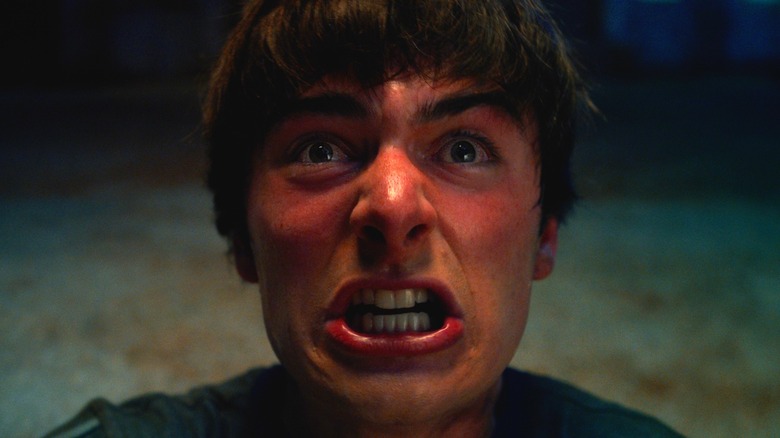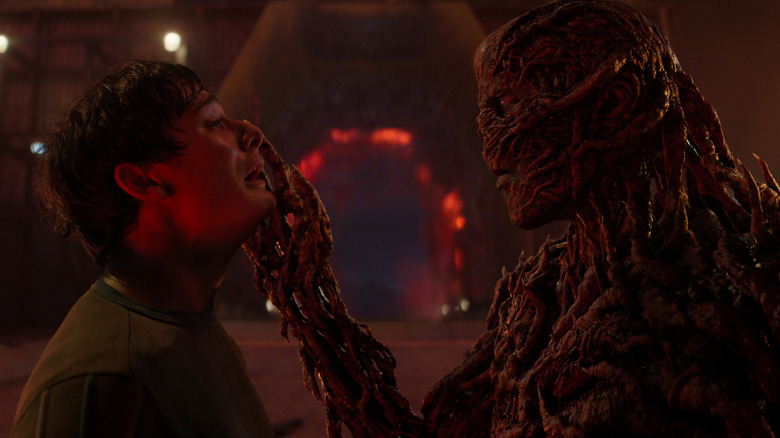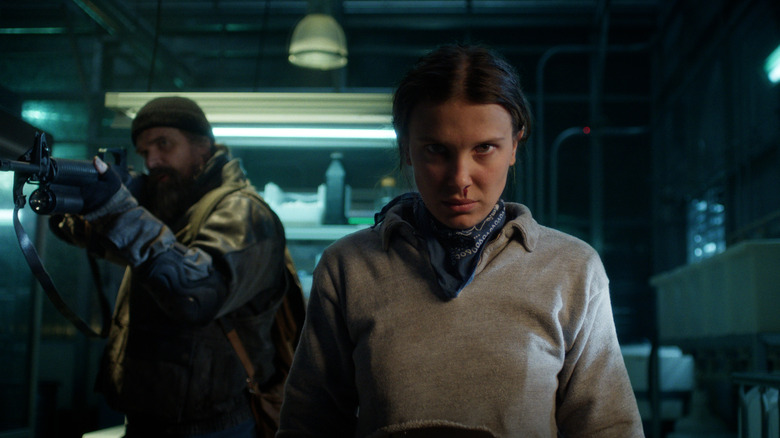Stranger Things Season 5 Continues Season 4's Huge Vecna Problem
This article contains spoilers for the first five episodes of "Stranger Things" season 5.
When Oscar Isaac stepped onto the set of "Star Wars: The Rise of Skywalker" and delivered that infamous line — "Somehow, Palpatine returned" — he gave a slogan to all the criticism that quickly flooded discourse around the film. The outrage was understandable. "The Rise of Skywalker" is a movie that asks you to ignore things you have seen with your own eyes and believe things that were never shown. And while I know this should be a time of celebration in the "Stranger Things" community, I can't help but think of Poe Dameron whenever I see Vecna (Jamie Campbell Bower) on screen.
If you're at all part of the online "Stranger Things" fan community, you'll know where I'm going with this. Vecna has become something of a dividing line in the fandom, and though I've tried to justify my absolute love of the early "Stranger Things" seasons with this other thing the series has become, I've failed to do so. Now, in season 5, the retcons go even deeper, turning even the season 1 abduction of Will Byers (Noah Schnapp) into just the first step in Vecna's carefully plotted master plan. Somehow, Vecna returned.
Season 5 opens with a flashback to Will's time spent in the Upside Down in season 1, where we see that Vecna chose him and spoke to him at the very start. This encounter sets up the climactic end of episode 4, where Will unleashes his own mind powers, akin to those of both Vecna and Eleven (Millie Bobby Brown). For some, this may have been a jump-out-of-your-seat-moment. For me, it was the final nail in the coffin, turning even the show's nearly flawless first season into grist for the franchise mill.
Vecna has hurt Stranger Things in the long run
The power of a twist is its ability to point backward and show you the secret thing hiding in the shadows the whole time. It is in this respect that the entire premise of Vecna as the Emperor Palpatine of "Stranger Things" falls flat. His supreme importance makes his absence through the first 60% of the show feellike a glaring error. And it doesn't help that he is in every way a less interesting villain than the abstract evil of the Upside Down was before he arrived.
It's fairly easy to write Vecna off as a retcon — a mid-series decision, given the show's immense popularity, to shunt the whole story off the "eldritch horror mystery" rails and onto the same gold-plated genre franchise track that so many other transmedia IPs have taken. If you asked anyone what the closest thing is that Netflix has to Star Wars, to Lord of the Rings, to Harry Potter, everyone would tell you "Stranger Things." But to exist in that sort of epic, large-scale space that leaves room for spin-offs, tie-ins, Broadway plays, and the like, you need to hit certain beats. You need, for example, a Palpatine. You can't have "The Avengers" without Thanos.
The problem is that Vecna feels more like Cobra Commander or Skeletor. Perhaps that was the goal, given the show's fixation on '80s pop culture touchstones, but it makes for a woeful Big Bad. The mystery Vecna replaced is the reason people got invested in the lore of "Stranger Things" to begin with. And while sticking with a voiceless, unknowable villain may have presented challenges, I refuse to believe that the story is better served by trading a whole dimension of sci-fi possibilities for a single angry guy.
Can Stranger Things fix its Vecna problem?
Four episodes of "Stranger Things" remain. Whatever happens there could change my mind, and the minds of all the other fans who fell off the show when it became all about Vecna. Personally, I would love nothing more. "Stranger Things" season 1 was and remains a triumph — a deft blend of aesthetics, nuanced character writing, and genre mastery, anchored by cohesive themes of family and friendship. It's no wonder it caught on like it did, and I loved a lot of what followed, albeit a bit less with each passing season.
A fantastic ensemble — which "Stranger Things" has always had — can overshadow a lot of narrative issues, and the Duffer brothers have given us enough standout moments in every season (Max's escape from Vecna in season 4 stands out as a later example) to make most complaints feel unnecessary. But I thought "Stranger Things" season 1 was supposed to be like "Jaws." Remind me where it is in "Jaws" that the dark lord of the sharks arises with his own, even bigger boat?
Maybe I'm just the old man yelling at the cloud. I have deeply loved "Stranger Things," no more so than through the story of Will and Jonathan in season 1. I loved the idea that nothing, not even a power so dark and horrifying it defies explanation, could keep a family apart. Anyone with brothers, I'm sure, can relate.
The end of the series may well satisfy most fans, but I find it tragic that the best parts of this show have been retconned before our eyes to feed some more franchisable, entirely less interesting thing. And I fear that no matter how expensive the series finale might be, it'll still just be the Battle of Exegol.


